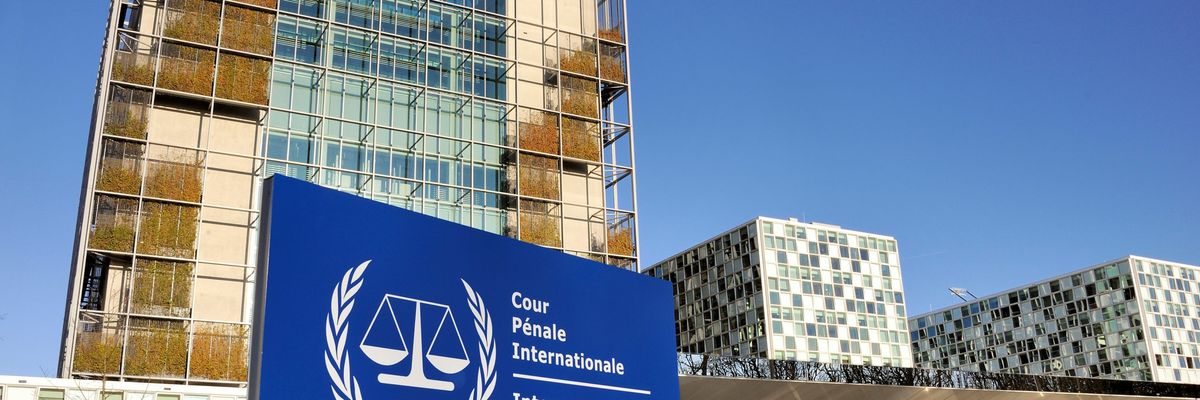When U.S. Secretary of State Mike Pompeo stepped to the State Department podium on March 17 to threaten possible sanctions, the targets were not, as you might expect, human rights abusers. Instead, Pompeo called out two staff members of the International Criminal Court (ICC) by name and signaled the U.S. was looking to take action against them, other ICC personnel, and even their family members.
The conduct that was the target of these threats was an investigation by the ICC — an international court of last resort — into war crimes and other serious crimes committed in connection with the war in Afghanistan, including those allegedly committed by U.S. military or CIA personnel. An ICC appeals chamber on March 5 overturned a pre-trial chamber decision and authorized the court’s prosecutor to open the probe, more than two years after her initial request.
Last year, the U.S. announced a policy of visa bans against certain ICC officials and revoked the ICC prosecutor’s visa in retaliation for the potential investigation. At the time, Pompeo said the U.S. could go further, including by imposing economic sanctions, if the ICC moved forward with investigations of U.S. nationals. He also signaled the U.S. could use its visa ban policy to deter ICC investigations of nationals of U.S. allies, including Israel (there is a separate possible ICC investigation into crimes committed in Palestine).
The U.S. is acting to undermine the legitimate work of a treaty-based international court that steps in only where national courts do not conduct genuine investigations or prosecutions of serious international crimes. It has a mandate in the 123 countries that are members and can also act in other countries when they agree or when a situation is referred by the U.N. Security Council, as in Darfur and Libya. The U.S. has never joined the court, but previous U.S. administrations have at times supported the court’s work. Current ICC investigations include examination of Myanmar’s ethnic cleansing campaign, which forced more than 700,000 Rohingya Muslims to flee into neighboring Bangladesh, an ICC member.
The ICC’s Afghanistan investigation will bring the Taliban’s indiscriminate attacks and Afghan government forces’ abuses under judicial scrutiny. This could help bolster prospects for peace in the country. Previous political transitions in Afghanistan ignored accountability and fed renewed cycles of violence as those responsible for the abuses retook positions of power. Victims have overwhelmingly supported an ICC investigation.
The ICC prosecutor will also examine serious abuses of detainees by CIA and U.S. military personnel. The court has jurisdiction because these abuses were committed in ICC member countries, including — in addition to Afghanistan — Lithuania, Poland, and Romania. There’s nothing unusual about this. U.S. citizens who commit crimes abroad are already subject to the jurisdiction of foreign courts, and the ICC draws from that authority.
As a result, the investigation is also a critical opportunity to finally address abusive U.S. government actions after 9/11 — which continue to have devastating consequences. The CIA’s abusive rendition, detention, and interrogation program has been well-documented, including by a nearly 7,000-page Senate intelligence committee report. All but a 500-page summary remains classified, signaling how reluctant some in the U.S. government have been to subject the program to public scrutiny.
There has been no meaningful action in U.S. courts to hold those responsible for CIA torture to account. To the contrary, people implicated in illegal conduct have been promoted. Among them is Gina Haspel, the current CIA director, who allegedly ran the CIA’s first “black site” in Thailand where detainees were tortured. Without real accountability, there is no reason to think the U.S. might not again resort to such illegal conduct. Indeed, last week in the midst of the country’s focus on the novel coronavirus, it was reported that the Justice Department had quietly sought congressional authorization to detain people indefinitely without charge or trial — a practice now in its eighteenth year at Guantanamo.
Only a handful of cases for detainee abuse have been pursued in the U.S., and even those were largely for lower-level personnel rather than officials who planned, authorized, and carried out the U.S. torture program. So it seems unlikely that there will ever be any true criminal accountability in a U.S. court. Last year, President Trump reversed the demotion of the U.S. Navy SEAL Eddie Gallagher, who had been convicted of posing with the corpse of an alleged ISIS member, a violation both of the Geneva Conventions and Defense Department rules. Trump also pardoned two Army officers convicted of war crimes.
These actions suggest that accountability in the U.S. will be a long time coming. If there is an about-face, and the U.S. conducts genuine proceedings relevant to cases the ICC prosecutor is likely to pursue in her office’s Afghanistan investigation, it could challenge the admissibility of cases before the court. But unless and until that happens, the ICC has a critical role to play in ensuring that victims have a path to justice. Those in the U.S. government who support the rule of law should be embracing rather than condemning the prospect of accountability.
















